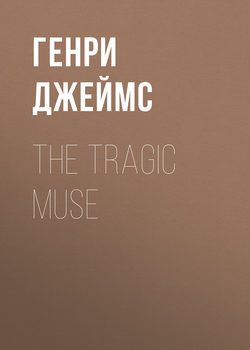The Tragic Muse

Реклама. ООО «ЛитРес», ИНН: 7719571260.
Оглавление
Генри Джеймс. The Tragic Muse
PREFACE
BOOK FIRST
I
II
III
IV
V
VI
BOOK SECOND
VII
VIII
IX
X
XI
XII
BOOK THIRD
XIII
XIV
XV
XVI
XVII
BOOK FOURTH
XVIII
XIX
XX
XXI
BOOK FIFTH
XXII
XXIII
XXIV
XXV
XXVI
XXVII
XXVIII
XXIX
XXX
XXXI
BOOK SIX
XXXII
XXXIII
XXXIV
XXXV
XXXVI
XXXVII
XXXVIII
XXXIX
XL
XLI
BOOK SEVENTH
XLII
XLIII
XLIV
XLV
XLVI
BOOK EIGHTH
XLVII
XLVIII
XLIX
L
LI
Отрывок из книги
The people of France have made it no secret that those of England, as a general thing, are to their perception an inexpressive and speechless race, perpendicular and unsociable, unaddicted to enriching any bareness of contact with verbal or other embroidery. This view might have derived encouragement, a few years ago, in Paris, from the manner in which four persons sat together in silence, one fine day about noon, in the garden, as it is called, of the Palais de l'Industrie—the central court of the great glazed bazaar where, among plants and parterres, gravelled walks and thin fountains, are ranged the figures and groups, the monuments and busts, which form in the annual exhibition of the Salon the department of statuary. The spirit of observation is naturally high at the Salon, quickened by a thousand artful or artless appeals, but it need have put forth no great intensity to take in the characters I mention. As a solicitation of the eye on definite grounds these visitors too constituted a successful plastic fact; and even the most superficial observer would have marked them as products of an insular neighbourhood, representatives of that tweed-and-waterproof class with which, on the recurrent occasions when the English turn out for a holiday—Christmas and Easter, Whitsuntide and the autumn—Paris besprinkles itself at a night's notice. They had about them the indefinable professional look of the British traveller abroad; the air of preparation for exposure, material and moral, which is so oddly combined with the serene revelation of security and of persistence, and which excites, according to individual susceptibility, the ire or the admiration of foreign communities. They were the more unmistakable as they presented mainly the happier aspects of the energetic race to which they had the honour to belong. The fresh diffused light of the Salon made them clear and important; they were finished creations, in their way, and, ranged there motionless on their green bench, were almost as much on exhibition as if they had been hung on the line.
Three ladies and a young man, they were obviously a family—a mother, two daughters and a son; a circumstance which had the effect at once of making each member of the group doubly typical and of helping to account for their fine taciturnity. They were not, with each other, on terms of ceremony, and also were probably fatigued with their course among the pictures, the rooms on the upper floor. Their attitude, on the part of visitors who had superior features even if they might appear to some passers-by to have neglected a fine opportunity for completing these features with an expression, was after all a kind of tribute to the state of exhaustion, of bewilderment, to which the genius of France is still capable of reducing the proud.
.....
"Ah not seriously!" Lady Agnes protested.
"That's the worst way," said Peter Sherringham. "Good things?"
.....